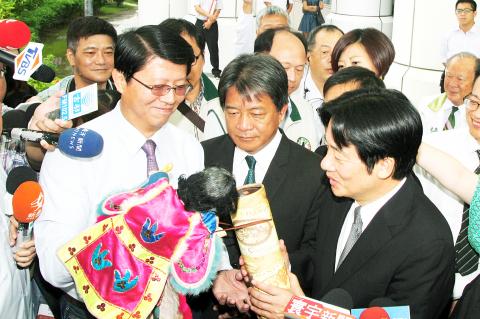Premier-designate William Lai (賴清德) yesterday promoted acting Minister of Economic Affairs Sheng Jong-chin (沈榮津) to minister and tapped National Development Council Deputy Minister Kung Ming-hsin (龔明鑫) to be Shen’s deputy.
National Security Council adviser Lin Feng-jeng is to succeed Wellington Koo (顧立雄) as the chairman of the Ill-gotten Party Assets Settlement Committee, Lai said.
Koo has been appointed chairman of the Financial Supervisory Commission.

Photo: CNA
Taiwan Institute of Economic Research (TIER) vice president Chiou Jiunn-rong (邱俊榮) is to be the next deputy minister of the National Development Council, Lai said.
“[Kung and Chiou] are young, energetic economic experts, and I believe they will be of great help to developing the economy,” Lai said.
Lai traveled from Tainan to Taipei at midday yesterday, then proceeded to consult incumbent Cabinet members via telephone from President Tsai Ing-wen’s (蔡英文) official residence.
Lai said the plan was to complete all Cabinet changes and announce them yesterday, but the consultation process took longer than expected due to prolonged discussion on policy issues.
He has yet to consult Minister of National Defense Feng Shih-kuan (馮世寬) and Minister of Foreign Affairs Minister of Foreign Affairs David Lee (李大維), Lai said.
“National defense and foreign affairs are the purview of the presidency. In addition, the two ministers are currently attending meetings overseas. As a result, they have yet to be consulted,” Lai said.
When asked whether the new Cabinet is to focus on economic development, Lai replied in the affirmative.
“The decision to appoint [Taiwan Stock Exchange chairman] Shih Jun-ji (施俊吉) as the vice premier, TIER vice president Chiou as the next National Development Council deputy minister and transferring the experienced Kung to be the deputy economic affairs minister were made to facilitate the implementation of economic policies,” he said.
A majority of Cabinet ministers will stay on, including Feng and Lee, the Executive Yuan said.
Other ministers who are to remain at their posts are: Minister of Labor Lin Mei-chu (林美珠), Environmental Protection Administration Minister Lee Ying-yuan (李應元), Minister of Transportation and Communications Hochen Tan (賀陳旦), Mainland Affairs Council Minister Katharine Chang (張小月), Overseas Community Affairs Council Minister Wu Hsin-hsing (吳新興), Minister of Education Pan Wen-chung (潘文忠), Minister of Culture Cheng Li-chiun (鄭麗君), Minister of Finance Sheu Yu-jer (許虞哲), Minister of the Interior Yeh Jiunn-rong (葉俊榮), Council of Agriculture Minister Lin Tsung-hsien (林聰賢) and Minister of Health and Welfare Chen Shih-chung (陳時中), according to the Executive Yuan.

ACTION PLAN: Taiwan would expand procurement from the US and encourage more companies to invest in the US to deepen bilateral cooperation, Lai said The government would not impose reciprocal tariffs in retaliation against US levies, President William Lai (賴清德) said yesterday, as he announced five strategies to address the issue, including pledging to increase Taiwanese companies’ investments in the US. Lai has in the past few days met with administrative and national security officials, as well as representatives from various industries, to explore countermeasures after US President Donald Trump on Wednesday last week announced a 32 percent duty on Taiwanese imports. In a video released yesterday evening, Lai said that Taiwan would not retaliate against the US with higher tariffs and Taiwanese companies’ commitments to

Intelligence agents have recorded 510,000 instances of “controversial information” being spread online by the Chinese Communist Party (CCP) so far this year, the National Security Bureau (NSB) said in a report yesterday, as it warned of artificial intelligence (AI) being employed to generate destabilizing misinformation. The bureau submitted a written report to the Legislative Yuan in preparation for National Security Bureau Director-General Tsai Ming-yen’s (蔡明彥) appearance before the Foreign Affairs and National Defense Committee today. The CCP has been using cognitive warfare to divide Taiwanese society by commenting on controversial issues such as Taiwan Semiconductor Manufacturing Co’s (TSMC, 台積電) investments in the

‘SPECIAL CHANNEL’: Taipei’s most important tasks are to stabilize industries affected by Trump’s trade tariffs and keep negotiations with Washington open, a source said National Security Council Secretary-General Joseph Wu (吳釗燮) arrived in the US for talks with US President Donald Trump’s administration, a source familiar with the matter said on Friday. Wu was leading a delegation for a meeting known as the “special channel,” the Financial Times reported earlier. It marked Trump’s first use of the channel since returning to the White House on Jan. 20. Citing a source familiar with the matter, the Financial Times reported that Minister of Foreign Affairs Lin Chia-lung (林佳龍) was also a part of the delegation. The visit came days after China concluded war games around Taiwan and amid Trump’s

HELPING HAND: The steering committee of the National Stabilization Fund is expected to hold a meeting to discuss how and when to utilize the fund to help buffer the sell-off The TAIEX plunged 2,065.87 points, or 9.7 percent, to close at 19,232.35 yesterday, the highest single-day percentage loss on record, as investors braced for US President Donald Trump’s tariffs after an extended holiday weekend. Amid the pessimistic atmosphere, 945 listed companies led by large-cap stocks — including Taiwan Semiconductor Manufacturing Co (TSMC, 台積電), Hon Hai Precision Industry Co (鴻海精密) and Largan Precision Co (大立光) — fell by the daily maximum of 10 percent at the close, Taiwan Stock Exchange data showed. The number of listed companies ending limit-down set a new record, the exchange said. The TAIEX plunged by daily maxiumu in just